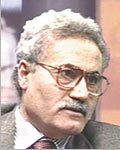SHIBLAK, ABBAS (1944-)
Born in Haifa in Jan. 1944; ended up in Lebanon with his extended family following the 1948 Nakba; studied towards an LLB in Law from Ein Shams University, Egypt from 1961-66; received an LLM in Public Law & Political Theories from Cairo University in 1968; returned to Beirut and worked as lawyer and journalist from 1968-70; moved to Algeria, where he worked as was Assistant Lecturer at the Dept. of Law and Economics, University of Constantine from 1970-73; moved back to Beirut to work as research officer at the IPS from 1973-85; worked also as a free-lance journalist in London, incl. 4 years as economic editor of Al-Sharq Al-Awsat from 1975-85; continued his studies and obtained an MPhil in Sociology from Kingston University, UK, in 1985; started working with the League of Arab States (LAS) in 1985, serving in various posts in Tunis, Cairo, Geneva and London until 1992, then served as Head of Information and Director in the Dept. of Palestinian Affairs at the LAS General Secretariat in London; was arrested by the British authorities in a high profile case on the eve of the first Gulf War, interned for 20 days, threatened with deportation for ‘reasons of national security,’ and, in the wake of public pressure, and admissions of police mistakes, was released; joined the Refugee Studies Center at the University of Oxford as a Senior Research Officer and Area Specialist between 1992-94; also served as member of the Palestinian delegation to the multilateral peace talks on refugees; moved with his family to Ramallah in 1994; co-founded the Palestinian Refugee and Diaspora Center (Shaml) in Ramallah and served as its first Director until 1997, when he returned to the UK; was a Research Fellow at the Refugee Studies Center, University of Oxford, from 1997-June 2005; also served as head of Information and Research at LAS, Cairo, from 1997-2005; currently serves as Minister Plenipotentiary and Director of the LAS mission in London; is a founding member of the Arab Committee on Human Rights, a member of Amnesty International, a member of the Advisory Board of the Forced Migration Review, published by the Refugee Studies Centre at Oxford University, and of the Board of Trustees at Shaml; wrote intensively on issues of displacement and forced migration, human rights, the status of minorities and various aspects of the Arab-Israeli conflict; recent publications include Iraqi Jews: A History of Mass Exodus (Saqi Books, 2005), and The Palestinian Diaspora in Europe - Challenges of Dual Identity and Adaptation (published jointly by Shaml and the Institute of Jerusalem Studies in Arabic and English, 2005).

شبلاق، عباس (1944 - ) ولد في حيفا عام 1944؛ وجد نفسه في لبنان مع عائلته بعد النكبة الفلسطينية عام 1948؛ درس القانون في جامعة عين شمس (مصر) من (1961- 1966)؛ حصل على إجازة في القانون العام والنظريات السياسية من جامعة القاهرة في 1968؛ عاد إلى بيروت وعمل صحفياً ومحامياً من (1968-1970)؛ انتقل إلى الجزائر، وعمل كمحاضر مساعد في قسم القانون والاقتصاد، جامعة قسطنطين من (1970-1973)؛ رجع إلى بيروت وعمل صحفياً مستقلاً ثم أمضى أربع سنوات في لندن، منها 4 سنوات كمحرر اقتصادي لصحيفة الشرق الأوسط من (1975-1985)؛ أكمل دراسته وحصل على الماجستير في علم الاجتماع من جامعة كينجستون، انجلترا، في 1985؛ بدأ العمل في مكاتب الجامعة العربية في 1985، خدم في عدة مناصب في تونس والقاهرة وجنيف ولندن حتى 1992، رئيس قسم الشؤون الفلسطينية في لندن؛ اعتقل من قبل السلطات البريطانية في عشية حرب الخليج الأولى لمدة 20 يوم؛ انضم إلى مركز دراسات اللاجئين في جامعة أكسفورد كباحث واختصاصي بين (1994-1992)؛ عضو في الوفد الفلسطيني لمحادثات السلام متعددة الأطراف عن اللاجئين؛ انتقل مع عائلته إلى رام الله في 1994؛ شارك في تأسيس مركز اللاجئين والشتات (شمل) في رام الله وخدم كرئيسها الأول حتى 1997، عندما عاد إلى انجلترا؛ كان زميل بحث في مركز دراسات اللاجئين، جامعة أكسفورد، من (1997-2005)؛ عضو مؤسس للجنة العربية لحقوق الإنسان، وعضو في منظمة العفو العام الدولية، وعضو في مركز دراسات اللاجئين في جامعة أكسفورد، ومجلس أمناء جمعية “شمل”؛ كتب ونشر في قضايا اللاجئين والهجرة الإجبارية، وحقوق الإنسان، ومنزلة الأقليات وأوجه متنوعة على الصراع العربي الإسرائيلي؛ المنشورات الحديثة تضم يهود العراق: تاريخ خروج الجماهير(كتب ساقي، 2005)، وشتات الفلسطينيين في أوروبا- تحديات الهوية الثنائية والتكيّف.
